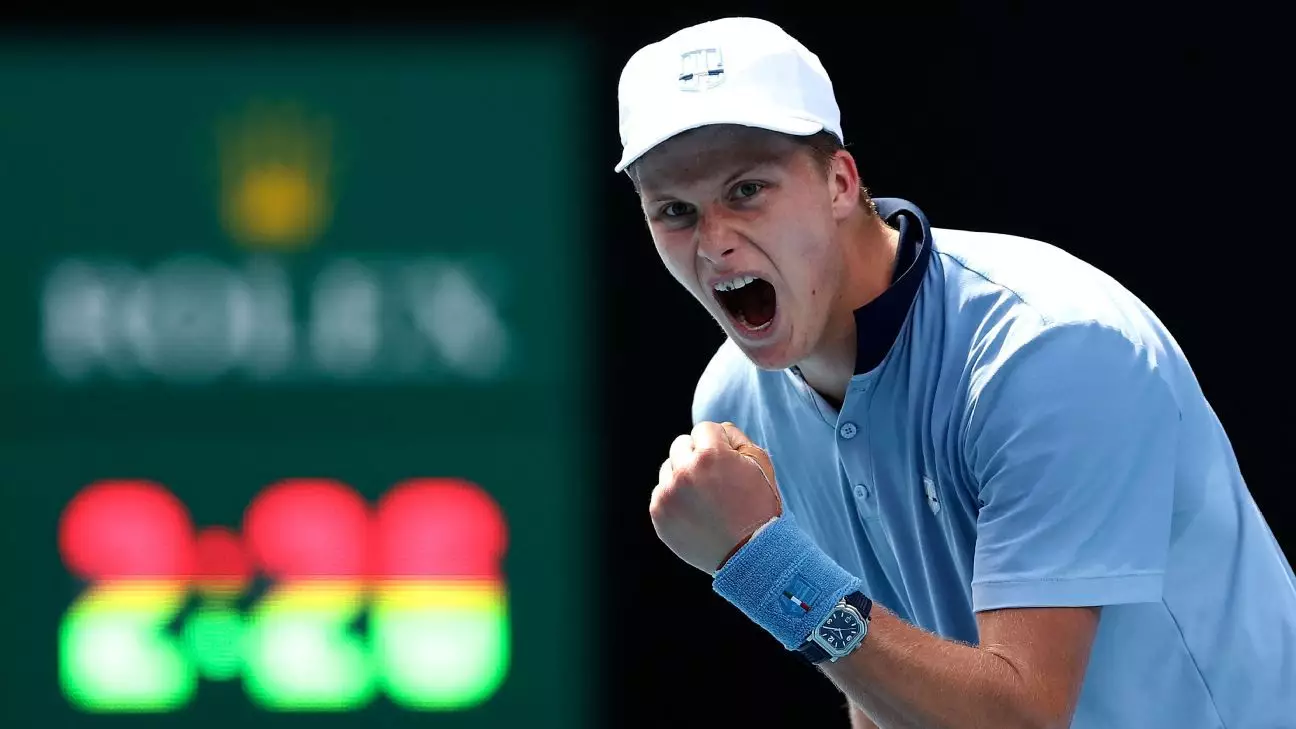Jenson Brooksby, a name that resonates with potential within the competitive realm of tennis, has embarked on a journey that transcends the confines of the court. With a background marked by both remarkable achievements and significant hurdles, Brooksby has recently opened up about his experience, particularly highlighting a nearly two-year hiatus from professional tennis. This time away was filled with not just physical struggles due to injuries and surgeries but also mental turbulence that he openly describes as “frustrating.” Once a promising talent, ranked 33rd globally in 2022, Brooksby found himself grappling with the intricacies of recovery while navigating the tumultuous waters of public scrutiny and personal identity.
Brooksby’s story takes a poignant turn as he shares his experiences living with autism spectrum disorder (ASD). In a candid conversation, he expressed a desire to shift the narrative surrounding autism from one of stigma to one of empowerment. Describing how his early childhood involved substantial therapeutic intervention to foster communication skills, Brooksby highlights the strength he derives from his condition, particularly under pressure during matches. His ability to hone in on specific details enables him to maintain focus in high-stakes situations—a trait that arguably serves as an advantage on the court.
Yet, this strength juxtaposes the challenges he faces. Brooksby candidly admits that when faced with adversity, he can experience emotional outbursts, making the sport’s inherent pressures even more difficult to navigate. His athletic trainer, Paul Kinney, serves not only as a coach but as a keen observer, monitoring Brooksby’s responses and ensuring his mental well-being. Such honesty sheds light on the complexities of integrating personal identity with professional aspirations, demonstrating how even athletes celebrated for their skills often battle unseen storms.
Complicating Brooksby’s journey further were the consequences of an 18-month suspension imposed by the International Tennis Integrity Agency (ITIA). This punitive action stemmed from missed drug tests rather than a positive result, but it still loomed large over his career. The detail that his suspension was ultimately reduced, allowing him to return in March 2024 rather than facing a lengthy absence, speaks volumes about the persistent fight he faces—not just against physical ailments but against institutional hurdles.
In appealing his suspension, Brooksby’s team introduced pivotal information regarding the unique challenges posed by his autism, specifically referencing the decision-making difficulties that are symptomatic of the condition. This move not only demonstrated a commitment to redefining perceptions of autism but also highlighted the need for greater understanding and accommodation within the realm of professional sports.
As Brooksby gears up for his return to competitive play, his focus on the upcoming Challenger Tour represents more than just a foot back in the game; it symbolizes resilience in the face of adversity. The talented young man has undergone extensive rehabilitation, not merely refining his physical skills but also reshaping his approach to competition. Training with seasoned coaches, he aims to rebuild his serve and ensure his body can withstand the rigors of the ATP tour.
Determined to maximize his potential, Brooksby adopts an “all-or-nothing” attitude when competing—a mindset that coach Eric Nunez commends. Yet, despite the rigorous training, the mental aspect of self-identity remains crucial. As he ventures into pre-tournament practice sessions leading up to major events like the Australian Open, Brooksby is no longer just a player seeking victories; he is an advocate, eager to share his narrative while reminding the world that authenticity and vulnerability define true strength.
Jenson Brooksby’s journey epitomizes resilience, showcasing the intricate relationship between personal struggles and professional aspirations. As he prepares for a return to the tennis circuit, the spotlight on his autism spectrum disorder serves as both a challenge and a beacon of hope for many who resonate with his story. His experience underscores the importance of self-advocacy, and as he embraces his identity, Brooksby invites the world to witness not just an athlete in pursuit of success, but a human being navigating the complexities of life, one match at a time. In doing so, he challenges the sports community—and society at large—to celebrate diversity and champion understanding in every arena.


Leave a Reply